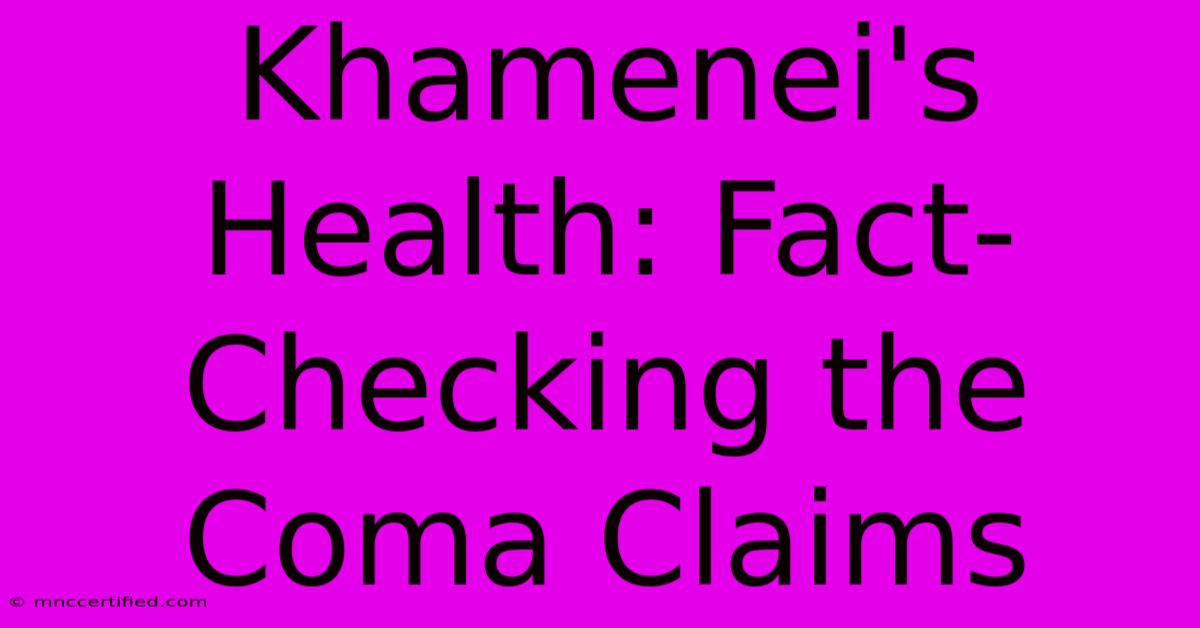Khamenei's Health: Fact-Checking The Coma Claims

Table of Contents
Khamenei's Health: Fact-Checking the Coma Claims
The health of Ayatollah Ali Khamenei, Supreme Leader of Iran, has been a subject of intense speculation, particularly online. Recurring rumors, often amplified through social media, claim he's in a coma or suffering from a debilitating illness. This article aims to critically examine these claims, separating fact from fiction and exploring the challenges of verifying information emanating from a tightly controlled state like Iran.
The Information Vacuum and the Power of Rumor
Iran's government maintains strict control over information, making independent verification of Khamenei's health extremely difficult. Official statements are infrequent and often lack transparency. This information vacuum creates fertile ground for rumor and speculation. Any absence of public appearances, however brief, can be quickly amplified and misinterpreted, fueling conspiracy theories.
The Role of Social Media
Social media platforms, while offering channels for information dissemination, also contribute to the rapid spread of misinformation. Unverified reports and unsubstantiated claims, often originating from anonymous sources, quickly go viral, making it challenging to distinguish credible sources from unreliable ones. The lack of fact-checking mechanisms on many platforms exacerbates this issue.
Analyzing the Coma Claims: A Critical Approach
Claims regarding Khamenei's health, including those alleging a coma, often lack verifiable evidence. Many reports rely on anonymous sources, uncorroborated testimonials, or interpretations of ambiguous visual information (e.g., photographs or videos). Such evidence is inherently weak and should be treated with extreme skepticism.
Evaluating Sources: A Checklist
Before accepting any information about Khamenei's health, consider the following:
- Source credibility: Is the source reputable and known for accurate reporting? Be wary of anonymous sources or those with a clear political agenda.
- Evidence presented: Does the claim offer concrete evidence, such as medical records or statements from reliable officials? Anecdotal evidence alone is insufficient.
- Verification: Can the information be corroborated by multiple independent and reliable sources? A single source is not enough to establish the truth.
- Bias detection: Is the source exhibiting bias, potentially exaggerating or distorting the facts to fit a particular narrative?
The Importance of Media Literacy in the Digital Age
The case of Khamenei's health highlights the crucial need for media literacy in the digital age. Developing skills to critically evaluate information, identify misinformation, and discern credible sources is essential to navigate the complex information landscape.
Strategies for Informed Citizenship
- Verify information: Always check the validity of information from multiple reputable sources before accepting it as fact.
- Be aware of biases: Recognize potential biases in news sources and consider multiple perspectives.
- Develop critical thinking skills: Learn to analyze information objectively and identify logical fallacies.
- Support fact-checking initiatives: Encourage and support organizations dedicated to verifying information and combating misinformation.
Conclusion: The Need for Transparency and Responsible Reporting
While speculation about Khamenei's health will likely persist, it's crucial to approach such claims with a healthy dose of skepticism. The lack of transparency from Iranian authorities only fuels the spread of rumors and misinformation. Responsible journalism and a commitment to verifying information are vital in providing the public with accurate and reliable reporting. Until credible evidence emerges from verifiable sources, claims about Ayatollah Khamenei's health should be treated as unsubstantiated speculation. The spread of unverified information only contributes to instability and uncertainty, underscoring the importance of responsible media consumption and the need for transparent communication from official sources.

Thank you for visiting our website wich cover about Khamenei's Health: Fact-Checking The Coma Claims. We hope the information provided has been useful to you. Feel free to contact us if you have any questions or need further assistance. See you next time and dont miss to bookmark.
Featured Posts
-
Hilarious Moment Brolin And Dinklage
Nov 17, 2024
-
Multi Family Investment Properties
Nov 17, 2024
-
Wisconsin In Finalist List Top 2026 Linebacker
Nov 17, 2024
-
Miracle Baby For Oritse Williams
Nov 17, 2024
-
Dale Earnhardt Trading Cards Worth
Nov 17, 2024